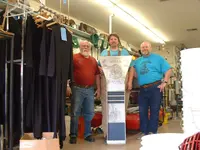[TD="bgcolor: #cccccc"]US Supreme Court: Transfers within Waterway Do Not Require NPDES Permits
Added 01-11-13[/TD]
[TD="class: text"][/TD]
[TD="class: text"]The U.S. Supreme Court ruled Jan. 8, 2013 that discharging polluted water from one part of a waterway to another part of the same waterway does not require an NPDES permit under the Clean Water Act. The case is
Los Angeles Flood Control District v. NRDC
.
The Supreme Court's ruling reverses a decision by the U.S. Court of Appeals for the Ninth Circuit, which had held that the Los Angeles County Flood Control District violated its discharge permit by channeling polluted stormwater from concrete-lined to unlined portions of the Los Angeles and San Gabriel rivers.
The Supreme Court granted review solely on the issue of whether water flowing from one portion of a river through an artificial channel into another portion of the same river constituted a discharge subject to Clean Water Act permitting requirements.
The court's decision reaffirmed that the transfer of polluted water between two parts of the same water body does not constitute a discharge of pollutants under the act, citing its 2004 decision in
South Florida Water Management District v. Miccosukee Tribe of Indians
, 541 U.S. 95, 105, 58 ERC 1001 (2004).
Quoting from a Second Circuit opinion, the Supreme Court said, “If one takes a ladle of soup from a pot, lifts it above the pot, and pours it back into the pot, one has not 'added' soup or anything else to the pot.”
Accordingly, the Supreme Court wrote, “no discharge of pollutants occurs when water, rather than being removed and then returned to a water body, simply flows from one portion of the water body to another.”
We hold, therefore, that the flow of water from an improved portion of a navigable waterway into an unimproved portion of the very same waterway does not qualify as a discharge of pollutants under the CWA,” the Supreme Court wrote.[/TD]






 ?
? . Wait a minute, we had (have) that right. Shoulda never come to this and the Judge agrees. I'm a happy prospector.
. Wait a minute, we had (have) that right. Shoulda never come to this and the Judge agrees. I'm a happy prospector.
 We will miss all of those that didn't make it to the end like Jerry Hobbs and Dennis Robinett pictured with Frank Sullivan and I with the Karuk Sluice that we won and re-donated to the cause. I don't remember who made the sluice maybe one of you guys can remember or chime in
We will miss all of those that didn't make it to the end like Jerry Hobbs and Dennis Robinett pictured with Frank Sullivan and I with the Karuk Sluice that we won and re-donated to the cause. I don't remember who made the sluice maybe one of you guys can remember or chime in 

